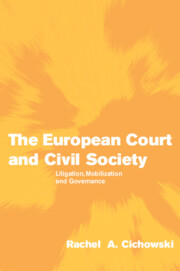Book contents
1 - Introduction: institutions, organizations and actors
Published online by Cambridge University Press: 22 September 2009
Summary
In the late 1950s, moved by the hope for peace and economic prosperity in Europe, six governments constructed the foundations of an unprecedented form of supranational governance: the European Community. Heads of governments negotiated the rules and organizations that would govern what was largely an international economic agreement. Interest groups and civil society were not directly involved in these negotiations and public interest issues were not on the agenda.
Today, in the year 2006, this same supranational space – the European Union (EU) – possesses an ever-expanding net of public policies, including women's rights and environmental protection. These policy areas have consistently been guarded by national governments, who have been hesitant to let the EU legislate in the area of national social policy and environmental preservation. Today, public interests groups and civil society – from feminist activists to environmental groups – and increasingly powerful EU organizations, such as the European Court of Justice (ECJ) – are equally present in this supranational policy arena. Individuals possess enforceable rights under EU law and public interest groups are now permanent participants in EU policy processes. This book explains how this remarkable transformation took place – how an international treaty governing economic cooperation became a quasi-constitutional polity granting individual rights and public inclusion. I argue that the ECJ and civil society were integral to this transformation.
This book examines the emergence and evolution of supranational governance in Europe.
- Type
- Chapter
- Information
- The European Court and Civil SocietyLitigation, Mobilization and Governance, pp. 1 - 25Publisher: Cambridge University PressPrint publication year: 2007



